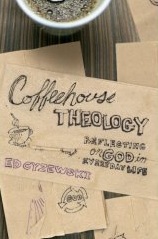
Welcome to the next stop on the Coffeehouse Theology Blog Tour. This is a blog book tour for Ed Cyzewski’s book entitled, “Coffeehouse Theology: Reflecting on God in Everyday Life.” Given that I am toward the end of the blog tour, there have been many people who have written some really wonderful reviews of the book, including a couple of my friends Makeesha, Adam and John. I encourage you to go and check out their thorough reviews if you have time.
I think that this book could be a great one for the right type of person. As the title suggests, this is a book about theology – “coffeehouse theology.” This is theology that is done in the coffeehouses, in the streets, in the office cubicles, on the buses and in the classrooms. I think this is a great way to think about our “God-talk.” And I really appreciated Ed’s definition of what he thinks coffeehouse theology is: “a way of reflecting on God in everyday life that takes our context seriously” (p 52). I know some folks who think that theology should be left to those who have had the education necessary to have those deep theological conversation – that theology is “for the elite.” That is not a view I hold, and clearly not one that Ed holds either.
What I believe is probably the greatest gift of “Coffeehouse Theology” is that it puts the power of theological reflection back into the hands of the lay-person. It’s not something that just pastors do, or academics, or those trained in seminary. While those gifts can help and those of us who have that training should share with others what we learned in seminary – theology is something that everyone should feel that they can engage in.
Crucial to Ed’s thesis and idea of coffeehouse theology is the backdrop of contextual theology. If this is a new concept to you, then I’d highly recommend giving his book a read and immersing yourself in one person’s understanding of contextual theology and the way it will help us think about theology today. I agree with Adam, when he writes:
“For those of us for whom these ideas of context, social-location, and different world perspectives are a new concept the book would be really great — perhaps someone who grew up with a very strict black/white faith but who, after whatever experiences, is beginning to feel some cracks in the foundation of that sort of faith.”
Yet, for those who already have a rich background in thinking about theology from different perspectives and contexts, some of the book may seem a bit basic – since Ed hammers home the theme of contextual theology throughout the book.
Lastly, one of my favorite chapters was 11, “Our Love of God Unites Us in Theology.” In it, Ed lays out the complexities that come within contextual theology, and puts forward a hopeful way forward:
“Contextual theology has the potential to become pretty messy when we run into doctrines that unsettle beliefs we consider important. Other Christians might possess a broader understanding of salvation, a greater reverence for tradition, or a higher regard for the gifts of the Spirit. How can we learn from these believers and at the same time prevent further divisions?
The answer lies in what all Christians have in common: a love for God…Far from fragmenting Christians over their differences, the ongoing process of theology should draw diverse Christians together under the common goal of understanding this God of love.” (207-8)
Ed also points out that the work of coffeehouse theology is never done. He says that “While the core beliefs at the center of our theology – at the center of our web of beliefs – might never change, we will always be open to change” (209). I think I might be more open to the fact that we should remain open to the possibility that even some core ideas should be re-formed if the Spirit leads us that way, but I still appreciate Ed’s openness to the possibility of change, or progression and allowing ourselves the freedom to follow the movement of the Spirit.
I appreciate the work that Ed is doing through his book, and I would recommend it to the right group of people. It wasn’t a book that I found especially enthralling, but I think it is a good introduction to the ideas of contextual theology and the way that we think about our thoughts of God.
You can continue to follow the blog tour here, and here are some other links you might find interesting: